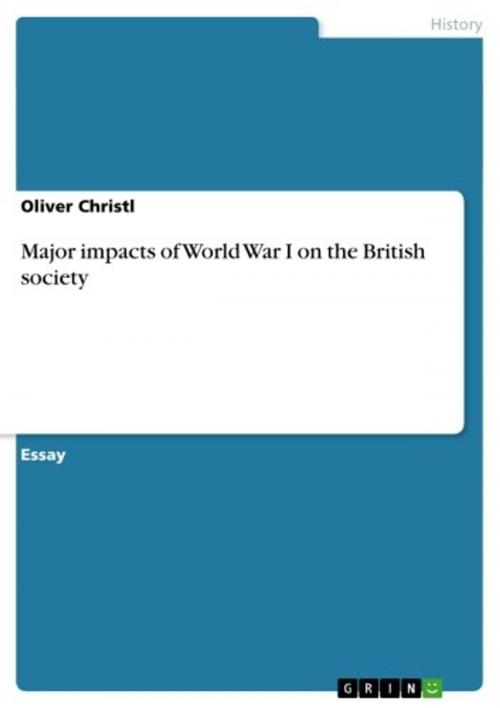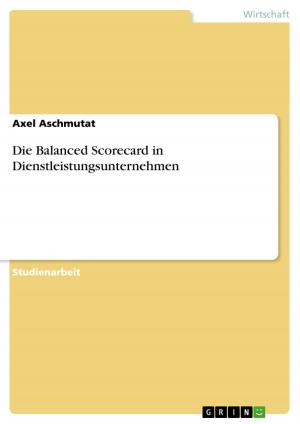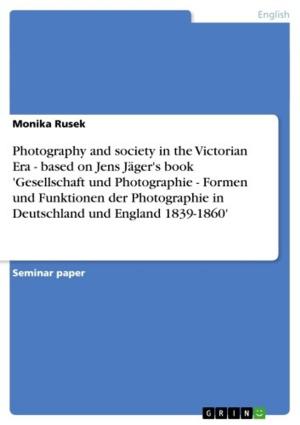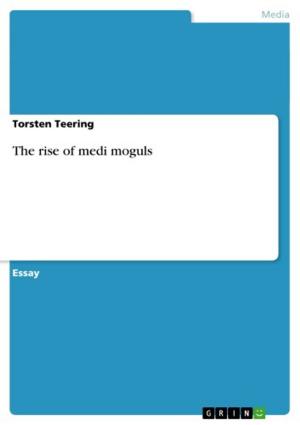| Author: | Oliver Christl | ISBN: | 9783640417995 |
| Publisher: | GRIN Publishing | Publication: | September 3, 2009 |
| Imprint: | GRIN Publishing | Language: | English |
| Author: | Oliver Christl |
| ISBN: | 9783640417995 |
| Publisher: | GRIN Publishing |
| Publication: | September 3, 2009 |
| Imprint: | GRIN Publishing |
| Language: | English |
Essay from the year 2005 in the subject History Europe - Germany - World War I, Weimar Republic, grade: 1,7, University of Birmingham, language: English, abstract: Although it ended over a lifetime ago, the First World War is still present in the memory of today's British society. It was the massive, and in the British national experience, unprecedented number of casualties that made it 'The Great War' in the perception of the British public. To face the challenge of total war both political practice and economy had to be transformed radically and, in a dramatically short period of time, hundreds of thousands of men had to be raised for the military forces. The whole society endured a heavy burden and was profoundly changed during the wartime. This essay investigates the major impacts of the First World War on the British society. Therefore, after describing the upcoming nationalism and a promoting class consciousness, both caused by the war, the examination focuses on the impact of the war on everyday life. Finally, the impact of the war on the British political culture is described. II. Heightened Nationalism and Class Consciousness Although the conflicts with some of her European colonial rivals in the late 19th century and the early 20th century led to an increasing effort in improving the logistic and training of Britain's military, resulting, for example, in the creation of the Committee of Imperial Defence (1902), the General Staff (1904) and the Officers' Training Corps , the military force Britain could raise at the beginning of World War I was, compared to the major continental powers France and Germany, relatively small. At the outbreak of war in August 1914, the British army had a regimental strength of less than a quarter of a million men. With regard to the high number of casualties the first severe battles in France claimed, the British government soon called for a much larger army. The Minister of War, Lord Kitchener, demanded a whole New Army and in response to his famous exhortation 'Your country needs YOU' over a million men had volunteered by Christmas 1914. By the end of the war in 1918, 5.2 million men had served in the army, over half of them as volunteers. Most of this mass army consisted of soldiers coming from the working class. The reasons for the thousands of workingmen joining the military forces were manifold: many saw in their service a chance to get away from the dull and hard working-life or to escape unemployment; some expected to see other countries and to come home as heroes. But one of the most influential reasons seems to have been the workers' fundamental loy
Essay from the year 2005 in the subject History Europe - Germany - World War I, Weimar Republic, grade: 1,7, University of Birmingham, language: English, abstract: Although it ended over a lifetime ago, the First World War is still present in the memory of today's British society. It was the massive, and in the British national experience, unprecedented number of casualties that made it 'The Great War' in the perception of the British public. To face the challenge of total war both political practice and economy had to be transformed radically and, in a dramatically short period of time, hundreds of thousands of men had to be raised for the military forces. The whole society endured a heavy burden and was profoundly changed during the wartime. This essay investigates the major impacts of the First World War on the British society. Therefore, after describing the upcoming nationalism and a promoting class consciousness, both caused by the war, the examination focuses on the impact of the war on everyday life. Finally, the impact of the war on the British political culture is described. II. Heightened Nationalism and Class Consciousness Although the conflicts with some of her European colonial rivals in the late 19th century and the early 20th century led to an increasing effort in improving the logistic and training of Britain's military, resulting, for example, in the creation of the Committee of Imperial Defence (1902), the General Staff (1904) and the Officers' Training Corps , the military force Britain could raise at the beginning of World War I was, compared to the major continental powers France and Germany, relatively small. At the outbreak of war in August 1914, the British army had a regimental strength of less than a quarter of a million men. With regard to the high number of casualties the first severe battles in France claimed, the British government soon called for a much larger army. The Minister of War, Lord Kitchener, demanded a whole New Army and in response to his famous exhortation 'Your country needs YOU' over a million men had volunteered by Christmas 1914. By the end of the war in 1918, 5.2 million men had served in the army, over half of them as volunteers. Most of this mass army consisted of soldiers coming from the working class. The reasons for the thousands of workingmen joining the military forces were manifold: many saw in their service a chance to get away from the dull and hard working-life or to escape unemployment; some expected to see other countries and to come home as heroes. But one of the most influential reasons seems to have been the workers' fundamental loy















